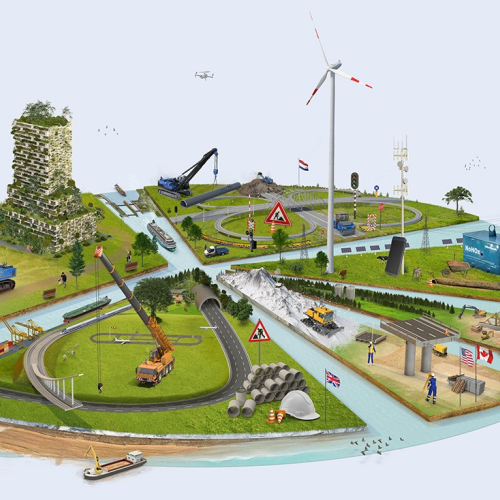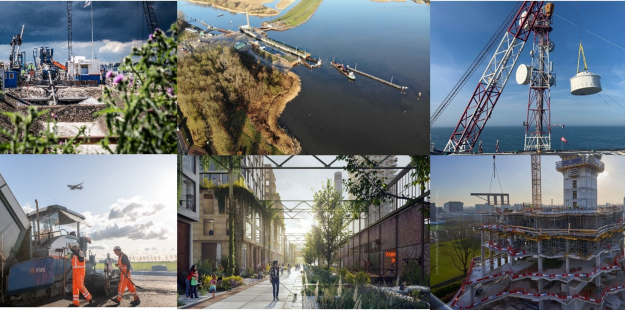VolkerWessels achieves solid results, despite Corona and nitrogen issues
Amersfoort, 17 March 2021 - Despite the impact of the Coronavirus pandemic, we are satisfied with the outcome of our results in 2020. VolkerWessels achieved an EBT of €156 million and a revenue of €6,448 million. The net result fell by 16% to €119 million. At the end of 2020, VolkerWessels’ order book had increased significantly to €9,618 million.

- Net result attributable to shareholders € 119 million (2019: € 141 million)
- Profit before tax (EBT) €156 million (2019: €174 million)
- Order book at year end 2020 €9,618 million
- Revenue € 6,448 million (2019: €6,642 million)
- Solvency 27.1% (2019: 31.4%)
- Corona and nitrogen issues depress 2020 results
Delisting of Euronext
For VolkerWessels, the beginning of the year was marked by the approaching delisting, which we were able to complete successfully. On 16 March 2020, Reggeborgh announced that it held 97.79% of the shares of Royal VolkerWessels and shortly afterwards it was announced that the listing of VolkerWessels would be terminated on 14 April 2020. On 18 September 2020, the Wessels family regained 100% ownership of the company.
Operations
In mid-March, the extensive impact of the Coronavirus pandemic became clear. We immediately took the necessary measures to be able to continue our projects in a safe and careful manner, with the health of our employees being a priority. The Samen Veilig Doorwerken (Working Safe Together) protocol in the Netherlands made an important and positive contribution to this.
Nevertheless, the pandemic has had a significant impact on our business. Besides personal suffering - we lost two colleagues to the Coronavirus - our results were also affected by the pandemic. The severe lockdowns in the second quarter, in the United Kingdom, the United States and Belgium, in particular, put pressure on the results in those markets. In the Netherlands, the consequences remained relatively limited and VolkerWessels suffered mainly from increasing inefficiency on projects. Disruption in the supply chain, employee absence and the deployment of extra equipment, in order to ensure 1.5 metre social distancing, led to extra costs that could not always be passed on to customers.
In our Dutch infrastructure operations, the impact of the nitrogen, PFAS/PFOS situation persisted. Although legislation to solve the nitrogen problem for the construction phase of projects has now been approved by Parliament, this legislation does not offer a solution for nitrogen emissions during the user phase of newly developed infrastructure. The persistence of the nitrogen issues, especially for the Infrastructure sector, is reflected in a lower order book for our Dutch infrastructure division. The absence of a structural solution will continue to have a negative impact on tendering for new infrastructure projects in 2021 and beyond.
The new Nitrogen Act will alleviate the nitrogen problem in housing, while the NoNOx filters we developed are already making a significant contribution towards mitigating this problem. In order to achieve the Government's objective of 100,000 new homes per year, it is necessary to facilitate the granting of permits and to increase the approval of housing development projects on the borders of the larger cities. Our expectation is that the proportion of industrially-produced homes will increase further. In October 2020, we delivered the two thousandth zero-energy bill, fully industrially-produced MorgenWonen home in Ede (The Netherlands).
Looking back, we can conclude that our company has weathered the pandemic well. Our pre-tax result in 2020 was €156 million, a 10% decrease compared to 2019.
Revenue
In 2020, revenue decreased by 2.9% to €6,448 million, compared to €6,642 million in 2019. This decrease in revenue is particularly visible in our infrastructure business in the Netherlands, the result of significant delays in tenders for larger integral infrastructure projects, due to the nitrogen, PFAS/PFOS issues from the summer of 2019. In the United Kingdom, our revenue also decreased due to delays in awarding new contracts and as a result of the difficult conditions caused by the Corona pandemic.
Order book
VolkerWessels' order book, as at 31 December 2020, increased significantly to a record amount of €9,618 million, compared to €8,916 million as at 31 December 2019. The increase of more than €0.7 billion is mainly driven by significant increases in the UK, in Energy & Telecoms and in Germany. The UK order book increased as a result of a number of significant contract awards, in particular High Speed 2 and East West Rail. The Energy & Telecoms order backlog increased mainly as a result of the extension to a long-term framework contract in the telecoms division. The order book in Germany increased due to the successful acquisition of several real estate positions for project development and construction projects in 2020. The order book in the infrastructure segment decreased by 19% (- €0.3 billion) because of the delay in tenders for large multidisciplinary infrastructure projects, as a result of the nitrogen and PFAS/PFOS issues. The Construction & Real Estate Development order book is stable compared to the end of 2019, and the order book in North America decreased, due to ongoing delivery of long-term maintenance contracts.
Solvency and liquidity
VolkerWessels has a solid capital structure, with a solvency of 27.1% at 31 December 2020 (31 December 2019: 31.4%). Group equity at year-end 2020 amounts to € 1.0 billion. Net liquidity (excluding IFRS 16) amounted to € 343 million at year-end 2020. VolkerWessels has not made use of the option of paying taxes due at a later date, with the exception of a small amount of VAT in the United Kingdom.

